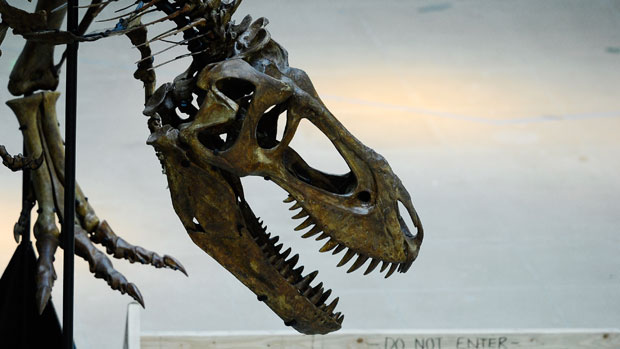Dinosaurs were killed off by a piece of 'colossal bad luck'
Prehistoric giants would probably have survived giant asteroid strike if it had been at different time

A free daily email with the biggest news stories of the day – and the best features from TheWeek.com
You are now subscribed
Your newsletter sign-up was successful
A stroke of "colossal bad luck" wiped out dinosaurs, according to a new study by 11 leading experts.
For many years, scientists have debated whether an asteroid or climate change caused the demise of dinosaurs. Now it seems that an unfortunate combination of factors finished them off.
Dr Steve Brusatte, of Edinburgh University, says prehistoric creatures might have survived if the six-mile wide asteroid, credited by many with wiping them out, them out had struck a few million years earlier or later.
The Week
Escape your echo chamber. Get the facts behind the news, plus analysis from multiple perspectives.

Sign up for The Week's Free Newsletters
From our morning news briefing to a weekly Good News Newsletter, get the best of The Week delivered directly to your inbox.
From our morning news briefing to a weekly Good News Newsletter, get the best of The Week delivered directly to your inbox.
He said environmental upheaval, including sea level rises and volcanic activity, had already made several species more susceptible to extinction at the time the asteroid struck what is now Mexico, some 66 million years ago.
"It was a perfect storm of events that occurred when dinosaurs were at their most vulnerable," Dr Brusatte, whose study used up-to-date fossil records and improved analytical tools, told the BBC.
Had the strike come a few million years earlier, dinosaurs might have survived as the range of species was bigger and food chains more robust. Had it occurred a few million years later, new species would have been given the chance to evolve, which would have helped them escape extinction.
Instead, the only dinosaurs to survive were those who could fly, and they evolved to become the birds of the present day.
A free daily email with the biggest news stories of the day – and the best features from TheWeek.com
How different history could have been. Dr Richard Butler, of the University of Birmingham, said: "Without that asteroid, the dinosaurs would probably still be here, and we very probably would not."
-
 Political cartoons for February 14
Political cartoons for February 14Cartoons Saturday's political cartoons include a Valentine's grift, Hillary on the hook, and more
-
 Tourangelle-style pork with prunes recipe
Tourangelle-style pork with prunes recipeThe Week Recommends This traditional, rustic dish is a French classic
-
 The Epstein files: glimpses of a deeply disturbing world
The Epstein files: glimpses of a deeply disturbing worldIn the Spotlight Trove of released documents paint a picture of depravity and privilege in which men hold the cards, and women are powerless or peripheral
-
 Home Office worker accused of spiking mistress’s drink with abortion drug
Home Office worker accused of spiking mistress’s drink with abortion drugSpeed Read Darren Burke had failed to convince his girlfriend to terminate pregnancy
-
 In hock to Moscow: exploring Germany’s woeful energy policy
In hock to Moscow: exploring Germany’s woeful energy policySpeed Read Don’t expect Berlin to wean itself off Russian gas any time soon
-
 Were Covid restrictions dropped too soon?
Were Covid restrictions dropped too soon?Speed Read ‘Living with Covid’ is already proving problematic – just look at the travel chaos this week
-
 Inclusive Britain: a new strategy for tackling racism in the UK
Inclusive Britain: a new strategy for tackling racism in the UKSpeed Read Government has revealed action plan setting out 74 steps that ministers will take
-
 Sandy Hook families vs. Remington: a small victory over the gunmakers
Sandy Hook families vs. Remington: a small victory over the gunmakersSpeed Read Last week the families settled a lawsuit for $73m against the manufacturer
-
 Farmers vs. walkers: the battle over ‘Britain’s green and pleasant land’
Farmers vs. walkers: the battle over ‘Britain’s green and pleasant land’Speed Read Updated Countryside Code tells farmers: ‘be nice, say hello, share the space’
-
 Motherhood: why are we putting it off?
Motherhood: why are we putting it off?Speed Read Stats show around 50% of women in England and Wales now don’t have children by 30
-
 Anti-Semitism in America: a case of double standards?
Anti-Semitism in America: a case of double standards?Speed Read Officials were strikingly reluctant to link Texas synagogue attack to anti-Semitism